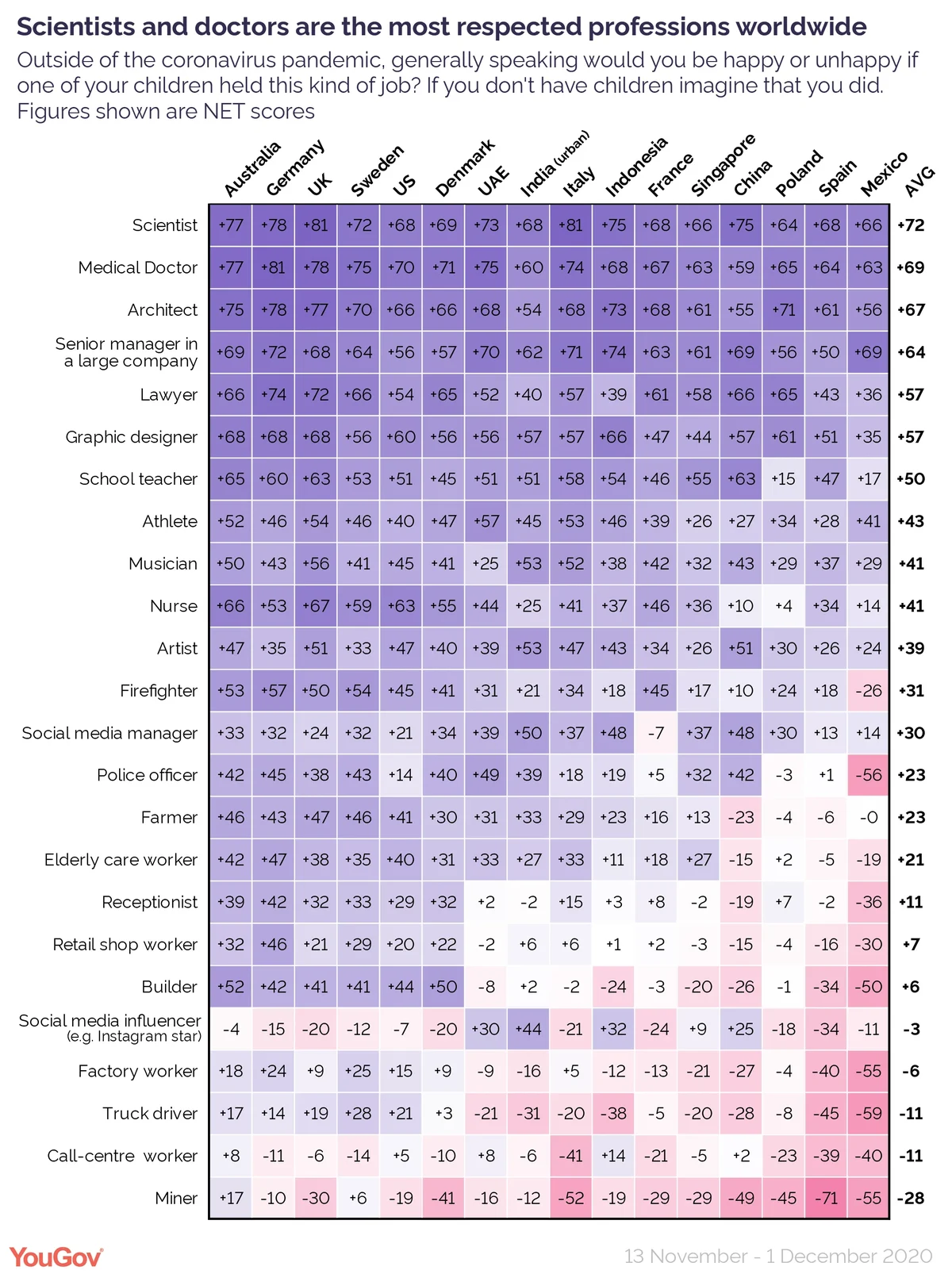Britons value nurses, scientists, musicians and farmers more than any other nationality does
A new international YouGov survey of more than 22,000 people in 16 countries reveals the most and least respected professions.
To test how people feel about a line of work, we asked respondents whether or not they would be happy for their child to go into each given job. The figures shown in this article are the net score each profession received (i.e. the number of people who would be happy for their child to do that job, minus the number who would be unhappy for them to do it).
Coming top of the list are scientists, with an average score of +72 across the 16 countries. Doctors are not far behind, on +69.
Also scoring highly are architects (+67), senior managers in large companies (+64), and lawyers and graphic designers (both +57).

At the very of the bottom of the list are miners, with an average score of -28, although in some countries it is far lower, like Spain (-71), Mexico (-55) and Italy (-52).
There are only two countries in which miners get a positive score: Australia (+17) and Sweden (+6).
The positive score in Australia is no doubt because miners can make a lot of money there. In 2011 the Wall Street Journal reported the case of miners making $200,000 a year in Australia, and research firm PayScale suggests that the average annual pay for a miner in Australia is currently AU$110,000 (equivalent to about £62,000).
Other relatively undesirable jobs include call-centre workers (-11), truck drivers (-11), factory workers (-6) and social media influencers (-3).
What are the most respected professions in Britain?
Here in Britain the top of the list looks much the same as internationally, with scientists the most well-respected profession (+81), followed by doctors (+78) and architects (+77).
Compared to other countries, Britons are especially likely to take a warm view of builders, at +41 (34pts higher than the international rate), truck drivers, at +19 (30pts higher than elsewhere) and nurses, at +67 (26pts higher, and the highest score in any country).
In fact, several of the professions listed are more highly regarded in Britain than anywhere else. Aside from nurses, Britons are also the most likely to favour scientists, musicians and farmers.
Overall, Britons tended to be more positive about jobs than most nationalities – on average only Australians and Germans had more favourable views.
Attitudes towards any given job tended to be lowest in Mexico and Spain. In fact, of the 24 jobs we asked about, 11 received their lowest score in Mexico.
Gender differences
Receptionists, graphic designers, lawyers and social media managers tend get higher scores with women across the global study. By contrast, miners and truck drivers tend to have higher scores among men.
There are notable differences depending on the country, however. In Mexico and Indonesia, for instance, there is a much more pro-male regard for builders, firefighters and truck drivers than is seen elsewhere.
In Italy and Sweden, almost every profession is seen more favourably by women than men. It is also noticeable that in every single European country women are much more likely than men to feel positively about receptionists (the rate is much lower in the rest of the world).
Age differences
Across all countries, young people are generally more likely to take a favourable view of jobs than their elders.
In news that will surprise no-one, the job of social media influencer is the one that most divides young and old, scoring +16 on average among 18-24 year olds worldwide, but -15 among those aged 55 and above.
More surprisingly, the newest job on the list is as divisive as the perhaps oldest: miner. Younger people rate the job at -13, while older people give it -43, a 30pt difference.







